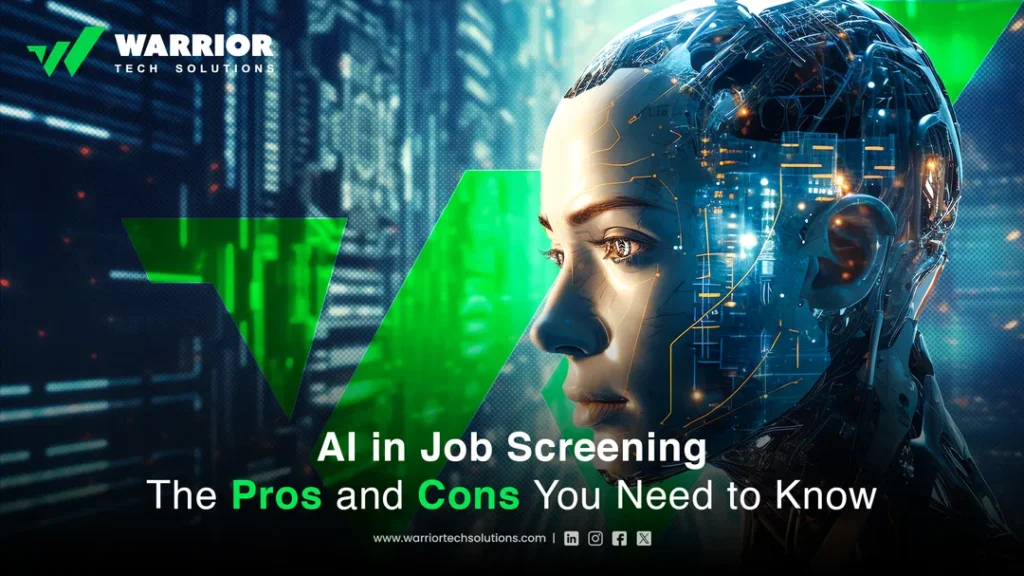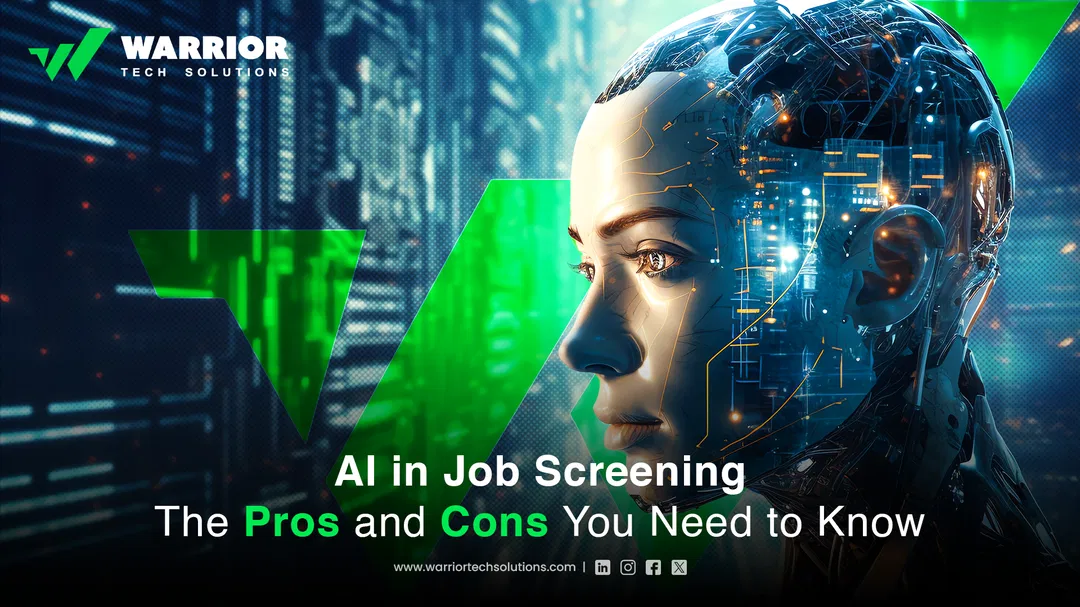
Artificial Intelligence (AI) is transforming industries across the globe, and the recruitment process is no exception. In particular, AI is increasingly being used to screen job applications, offering both advantages and challenges for companies. This article delves into the role AI plays in recruitment, its benefits, potential drawbacks, and how companies can balance technology with human insight.
1. The Rise of AI in Recruitment
AI-powered tools have been developed to automate and streamline many stages of the recruitment process, including:
- Resume Screening: AI can quickly analyze thousands of resumes, identifying keywords, qualifications, and experiences that match job descriptions.
- Applicant Tracking Systems (ATS): Modern ATS platforms use AI to help employers filter and rank candidates based on various criteria, speeding up the recruitment process.
- Chatbots: AI chatbots can interact with candidates, answer queries, and even schedule interviews, providing a seamless candidate experience.
Key Tip: AI in recruitment can save time, but human judgment is still essential for final decision-making.
2. The Pros of Using AI in Screening Job Applications
- Speed and Efficiency: AI can review resumes, cover letters, and applications in a fraction of the time it would take a human recruiter. This accelerates the initial stages of hiring.
- Consistency: AI eliminates human bias, ensuring every application is evaluated based on the same criteria, which leads to more consistent and objective assessments.
- Cost-Effective: By automating repetitive tasks, AI reduces the need for human recruiters to manually sort through resumes, cutting down on administrative costs.
- Enhanced Candidate Experience: With automated responses and scheduling, candidates receive quicker feedback, which can improve their overall experience during the hiring process.
Key Tip: AI makes recruitment more efficient and consistent, but should be used as a tool rather than a complete replacement for human judgment.
3. The Cons of Using AI in Screening Job Applications
- Bias in Algorithms: While AI can eliminate human biases, it can also inherit biases present in historical hiring data. This could lead to discrimination against certain groups of candidates.
- Lack of Human Touch: AI cannot gauge a candidate’s cultural fit or their interpersonal skills, which are crucial in determining long-term success within a team.
- Over-reliance on Technology: Over-dependence on AI may overlook qualified candidates who don’t use the “right” keywords or phrases, leading to missed opportunities.
- Potential Data Privacy Concerns: The use of AI in recruitment involves collecting and processing sensitive personal data, raising potential security and privacy risks.
Key Tip: It’s important to ensure that AI systems are transparent, fair, and free from bias to mitigate these drawbacks.
4. Best Practices for Using AI in Job Application Screening
- Human-in-the-loop Approach: Combine AI with human oversight to ensure that technology complements, rather than replaces, human decision-making. Use AI for the initial screening, but have a human review shortlisted candidates.
- Regular Audits: Regularly audit AI algorithms to ensure they are working as intended and not unintentionally favoring certain groups over others.
- Personalized Candidate Communication: While AI can handle administrative tasks, it’s essential to maintain a personal touch in communication, particularly during interviews and feedback.
- Transparency: Be transparent with candidates about how AI is being used in the recruitment process. Clear communication builds trust and helps manage candidate expectations.
Key Tip: A balanced approach to AI in recruitment can lead to the best outcomes for both employers and candidates.
5. The Future of AI in Recruitment
As AI technology continues to evolve, its role in recruitment will expand. In the future, we may see:
- More Advanced Screening Tools: AI will continue to refine its ability to evaluate soft skills, cognitive abilities, and potential cultural fit, making it a more holistic tool.
- Greater Personalization: AI could be used to create more personalized candidate experiences, with tailored feedback and more precise job matching.
- Integration with Other HR Tools: AI will become more integrated with other HR technologies, allowing for end-to-end automation of the recruitment process.
Key Tip: The future of AI in recruitment holds exciting possibilities, but human insight will always play a crucial role in shaping hiring decisions.
Conclusion
AI is revolutionizing the way companies screen job applications, offering numerous benefits such as speed, consistency, and cost-efficiency. However, it’s not without its challenges, including biases and a lack of personal interaction. The key to successfully leveraging AI in recruitment lies in combining it with human oversight, ensuring a fair and inclusive hiring process.
At Warrior Tech Solutions, we understand the importance of leveraging cutting-edge technology while maintaining the human touch. Our recruitment strategies use AI tools to enhance the process while ensuring candidates are evaluated fairly and comprehensively.
Contact us today to discover how our expertise can transform your business for the future.
📞 Contact us at +1 813-731-0144 | +91 989 455 4413
📧 Email us at info@warriortechsolutions.com
🌐 Visit our website at www.warriortechsolutions.com
FAQs
1. How does AI improve the recruitment process?
AI speeds up the initial stages of recruitment by automating tasks like resume screening and candidate matching, allowing recruiters to focus on higher-value tasks.
2. Can AI replace human recruiters entirely?
No, while AI is useful for automating repetitive tasks, human recruiters are still essential for making final decisions, assessing cultural fit, and conducting interviews.
3. Is AI biased in recruitment?
AI can inherit biases from historical data, so it’s crucial to regularly audit AI systems and ensure they are programmed to evaluate candidates fairly.
4. What are the privacy concerns related to AI in recruitment?
AI in recruitment involves processing personal data, which raises concerns about data security. Companies must ensure that they comply with data privacy laws and protect candidates’ sensitive information.
5. How can AI improve candidate experience?
AI can improve candidate experience by providing quick responses, personalized communications, and efficient scheduling, making the recruitment process smoother and more transparent.




